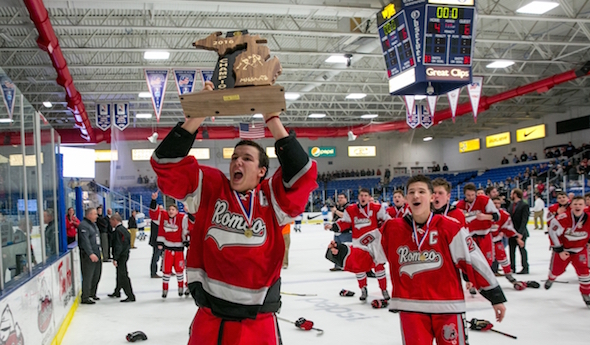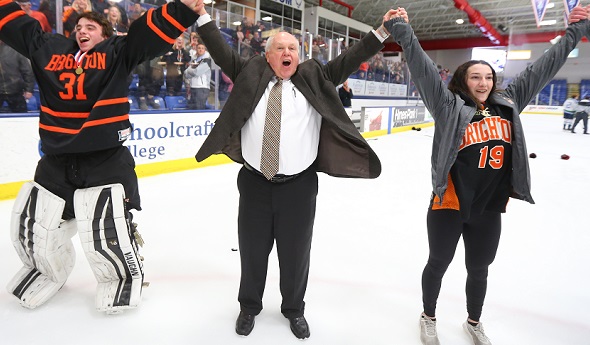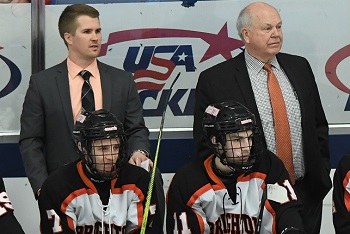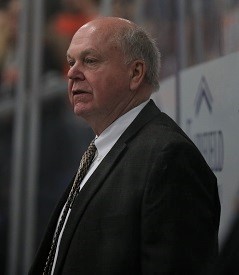
Hockey Team Becomes Romeo's Next Champ
March 12, 2016
By Bill Khan
Special for Second Half
PLYMOUTH — The students in the large Romeo cheering section might have been nervous.
Some of his teammates might have been getting nervous too.
Nolan Kare, however, couldn't allow himself to give in to the natural human reaction as the MHSAA Division 2 hockey championship appeared to be slipping away from the Bulldogs' grasp.
After scoring three straight goals during a frantic 5:02 stretch of the second period, a seasoned Livonia Stevenson squad held a 4-2 lead over a Romeo team that had never played on the biggest stage in Michigan high school hockey.
Kare stopped the last 11 shots he faced over the final 22 minutes and 21 seconds, backstopping Romeo to a 6-4 come-from-behind victory over Stevenson on Saturday at USA Hockey Arena.
"I know we kind of let up a little bit, but our team has so much heart," Kare said. "I know that if I just make the saves I'm supposed to make and try to rob a few that our team is going to give us the best chance to win. I know if I'm doing that, then I'm going to give them the best opportunity to put us in a position to get back."
Senior star Logan Jenuwine's tip-in goal during a five-minute power play with 10:21 left in the game snapped a 4-4 tie. Steven Morris scored an empty-net goal with 29.1 seconds left to seal the first MHSAA hockey title in the 15-year history of the Romeo program.
Suddenly, a school that had no MHSAA team championships going into the 2014-15 school year has three over the past 16 months. It began with the volleyball team winning the 2014 Class A championship and continued when the football team upset Detroit Cass Tech in the 2015 Division 1 title game at Ford Field.
"Before the game, we were saying if the football team could beat Cass Tech with 20 Division I (college) players coming up, we could beat Livonia Stevenson," Romeo senior forward Nick Blankenburg said. "Shocking the world and being part of such a great team feels incredible. To win a state championship for our school, to get those rings like our football team and volleyball team, I'll remember this my entire life."
Like the football and volleyball teams, the hockey team benefitted from a huge outpouring of support in a matchup that was witnessed by two passionate and energized fan bases.
"There's just something special about Romeo," said Kare, who finished with 29 saves and led the state with all 27 of Romeo's victories. "It's a small-town feel. You could see it out there. The entire town's out there for us. Just like football, just like volleyball, we had the whole community behind our back. We're just unbelievably blessed to have the best fan base, the best family, the best support out of anybody."
The atmosphere in which the Romeo and Stevenson players competed is one of the things that sets high school hockey apart from its competitors. Senior forward Ben Kowalske, who played in three MHSAA Finals for the Spartans, said neighbors will stop him and congratulate him on how the team is performing. Kowalske is the lone holdover from Stevenson's 2013 MHSAA Division 2 championship team and is a member of the MHSAA's Student Advisory Council.
"Being on the Council, you learn ideas and what other schools do," Kowalske said. "It's really amazing people are so interested in what we're doing. To have everyone come out to the game really means the world and really means a lot to us that we're doing something right here. You saw Romeo, too. They had the city support. It's cool. You try not to let it distract you during the game, but now that it's over, it's cool. It wasn't the outcome we wanted, but we did the best we could. It's really cool the community could come together over something and just forget about the world for a couple hours and just have fun."
 A defensive battle that was tied 1-1 for the first 23 minutes changed in a hurry as the second period neared its midway point.
A defensive battle that was tied 1-1 for the first 23 minutes changed in a hurry as the second period neared its midway point.
Romeo (27-2-1) grabbed a 2-1 lead at 6:18 of the second period on a goal by Jenuwine, but that only served to wake up the Spartans.
As Jenuwine's goal was being announced, Nick Beers scored the equalizer for the Spartans just 19 seconds later. Stevenson took its first lead 44 seconds later on a goal by Shane Leonard. Riding the crest of that momentum, the Spartans built their lead to 4-2 at the 11:39 mark on a goal by Nate Sudek.
With the game possibly slipping away, Romeo coach Nick Badder called what proved to be a critical timeout.
"We were down, they had all the momentum," Badder said. "I was telling (Adam) Krefski and the other assistants, 'Right now, they have all the momentum. We're on our heels, and we felt it. We calmed down the boys. Once they calmed down and realized it was shift by shift, we kind of took over."
Romeo got right back into the game before the second period ended, getting within 4-3 on Brett Lanski's second goal of the game with 2:34 left in the period and tying it when Luke Kaczor tipped in a shot from the point by Logan Ganfield with 1:30 to go in the period. Between the teams, six goals were scored during a 9:13 span.
Romeo was presented with a golden opportunity to break the tie when a Stevenson player received a five-minute major and game disqualification at 4:38 of the third period.
A power play that featured the highest-scoring player in the state wasn't going to miss over the course of five minutes. Jenuwine, who had 46 goals and 50 assists this season, scored what proved to be the game-winner at the 5:39 mark when he redirected a shot from the right point by Ganfield.
"It was going wide," said Jenuwine, who had two goals and three assists. "That's what I've been trying to work on mostly is get to the front of the net. I'm not really a guy to get to the front of the net; I did. It was a good shot by Logan Ganfield, and I got a tip on it."
Stevenson coach David Mitchell didn't blame the penalty for the loss.
"To say it turned there, it turned because they capitalized," Mitchell said. "They still had to capitalize, so you give them credit for capitalizing. We still had multiple chances to score and they had multiple chances to score. As a coach, it's so tough to explain to a bunch of 15-, 16-, 17-year-old kids that it's not one moment, it's an entire game. There were 51 minutes that were played out there where multiple other things happened."
Stevenson (22-7-1) had three offensive-zone face-offs in the final 1:25, but couldn't generate a scoring threat.
There might have been another had Morris' shot from inside his own blue line missed the target, but he found the center of the net for the game-clinching empty-netter with 29.1 seconds to go. For good measure, Morris blocked a shot in the final seconds.
Before Saturday, the Bulldogs' only playoff run beyond the Regionals came last season when they lost 8-2 to Grosse Pointe South in the MHSAA Quarterfinals.
"Last year's loss in the playoffs hurt," Badder said. "Grosse Pointe South took it to us; they kind of owned us. We didn't have a playoff game plan; we didn't have a playoff style last year. This year, I was so hard on these guys. We lost two games, and I was still, 'Guys, we're not doing this right, we're not doing that right.' They're like, 'Coach, we just won 6-1.' I was trying to get a point across to them that you've got to be a playoff team. You have to hit. You've got to block shots. You've got to get the puck in your own end. It's not the high-flying (Blankenburg) and (Jenuwine) show. We're a team, and the team will win in the end."
PHOTOS: (Top) Romeo players raise their first MHSAA championship trophy to the crowd after Saturday’s Division 2 Final. (Middle) Romeo’s Steven Morris (36) and Stevenson’s Sam Judd work to gain possession of the puck. (Click for more from Andrew Knapik.)

Brighton Coach's Impact 'Immeasurable'
By
Tim Robinson
Special for MHSAA.com
October 7, 2020
By Tim Robinson
Special for Second Half
Paul Moggach has never been much for looking back.
 And as he begins his first season away from the Brighton hockey program in more than three decades, he’s still looking ahead.
And as he begins his first season away from the Brighton hockey program in more than three decades, he’s still looking ahead.
“I’m thinking about what I’m going to miss more than the mark I left,” he said in a phone conversation last week. “I guess I enjoyed so much of the time I had, the opportunity to coach at Brighton, I’m thinking more how I fill the time and the things I'll miss.”
Moggach (pronounced MUG-uth) retired as Brighton’s coach this past summer after 25 seasons and having led five teams to MHSAA Division 1 championships. He compiled a record of 466-172-47 during that period.
But that’s not what he remembers most, nor why he wants people to remember him.
“I would like them to remember the teams and players who played for me and my assistants, more than me,” Moggach said. “We have so many blessings and opportunities in our lives, and hockey was one for me and hopefully for the players and assistants I worked with.”
One of those assistants was Kurt Kivisto, who joined the Bulldogs originally as a team manager more than 20 years ago and was a player at Brighton. He eventually won a national championship at Michigan State before rejoining the program as an assistant coach a decade ago.
“The No. 1 thing I’ll take from him is sticking by your beliefs and not sacrificing those beliefs for the team,” said Kivisto, who was named Moggach’s successor in September. “He sticks by those beliefs and ... he’s not willing to sacrifice that even if it could hurt the team. The character and integrity he has, how he treats people with fairness and what he believes is right is the biggest thing I’ll take.”
A stepson, Damon Whitten, played for Moggach at Brighton and at MSU before becoming an assistant coach and eventually the head coach at Lake Superior State, where he is in his eighth season.
Asked about Moggach’s impact at Brighton, Whitten said, “I’m not sure you can measure it. Your mind goes to the hockey players who have come to Brighton, and that’s a big part. But I think it goes beyond that. The money they’ve raised over the years for different families in need, for example. He’s had a big impact, and the players he had were a big part of that, but it goes well beyond that, and he did it the right way. Thirty-plus years (in the program), and I’m not sure you can count more than a handful of times where he made a bad decision or handled things poorly. He did things the right way, every day, all of the time, and I think it’s why he was so successful for so long.”
 The team’s charitable works were mostly kept under the radar – Moggach’s reasoning being his players had been given much, it was their turn to give back, and he didn’t want people thinking they did those things for publicity.
The team’s charitable works were mostly kept under the radar – Moggach’s reasoning being his players had been given much, it was their turn to give back, and he didn’t want people thinking they did those things for publicity.
Moggach joined Rick Bourbonais as an assistant at Brighton in the mid-1980s, then switched roles with him for the 1996-97 season.
He realized Brighton’s potential in the 1992-93 season, when the Bulldogs upset perennial state power Trenton in the Class A Quarterfinals before losing to Detroit Catholic Central in a Semifinal.
“That, to me, said, at least in my mind, that we can do this,” Moggach said. “It’s not impossible.”
He slowly began to build the program, getting good players and a schedule that would challenge them.
“You get the players by building a good culture,” he said. “Back in the day, when I started, we weren’t very disciplined and our league wasn’t very disciplined. So I think we realized we had to build that, and I could have an influence on building that in Brighton.”
Along with the culture, Moggach looked for an edge whenever he could find it. He was talked into making a trip to the Keweenaw Peninsula by one of his player’s parents, and found enormous benefits for his team, both competitively and in team bonding.
“It’s a lot about the little things we do,” he said, “that we find joy in, and create those opportunities. Creating the little moments really can build to bigger moments. We played capture the flag one day in about two feet of snow.
“Almost killed them,” he added, chuckling. The exhausted players didn’t have much left for the game that night, but spending time together for four days in a bus and hotel room always brought the team closer on and off the ice.
That first UP expedition also led to more teams making the trip, for team bonding and a glimpse of a part of the state, and themselves, they might never have seen otherwise.
“We didn’t do that for long,” he said. “But we always came back saying we were better together because of that experience.”
Bob Nelson had three sons play for Moggach, and Nelson’s wife, Kris, was president of the team’s booster club during their involvement over nearly a decade in Brighton hockey. Nelson also coached the program’s younger players for five seasons.
“We got to know the Moggachs really well,” he said. “It was a good experience, both as a coach and as a parent as well.”
Moggach introduced other things, including an emphasis on nutrition and off-ice training, that players resisted at first until they saw the benefits.
 He savored conversations with referees and opposing coaches before the games and even the occasional reporter after games.
He savored conversations with referees and opposing coaches before the games and even the occasional reporter after games.
But his first priority was the players. At times he would erupt in practice at a player or, more commonly, the team, and the boys soon learned to hear the message, not the volume. But for a couple of seasons, they also wrote some of his wilder statements down in a notebook after practice.
One year, they read some of them at the banquet, and after each one, Moggach’s wife, Sharon, would look at him and ask, “Did you really say that?”
Moggach would laugh and confess to remembering he had actually done so, then laughing.
“He knew part of what made the program good was his relationship to the players,” Nelson said. “If it was a good time, he wanted to enjoy it, even at his own expense at times.”
Moggach has staying in the background this offseason, letting Kivisto shape the team.
Asked if he were willing to fully switch coaching roles, as he and Bourbonais did a quarter-century ago, Moggach laughed.
“No,” he said emphatically. “Rick wasn’t in his 70s when we made the switch. Kurt needs his time. I’ll be there if he needs me.”
Moggach, who is 74, still works fulltime as the University of Michigan’s director of risk management.
He plans to spend more time with his wife and watch his grandsons play hockey, as well as catching some Lake Superior State games.
“I was really blessed to have Rick and Brownie (longtime assistant Mike Brown) along for the ride, and then to get Kurt involved,” Moggach said. “They weren’t the only ones, but they were the kids for me.
“The other thing is the support from the Brighton (High School) administration, the teachers, and our community. There are more people to thank than I could ever bring up. I do think that, all together, it was a great run. It couldn’t have been any better.”
PHOTOS: (Top) Recently-retired Brighton hockey coach Paul Moggach celebrates the 2018 Division 1 championship game win over Saginaw Heritage at USA Hockey Arena. (Middle) Former player Kurt Kivisto, left of Moggach during the 2018 Semifinal win over Detroit Catholic Central, served as an assistant before assuming the head coaching job in September. (Below) Brighton's 2018 championship was its fifth under Moggach. (Photos by Hockey Weekly Action Photos.)

